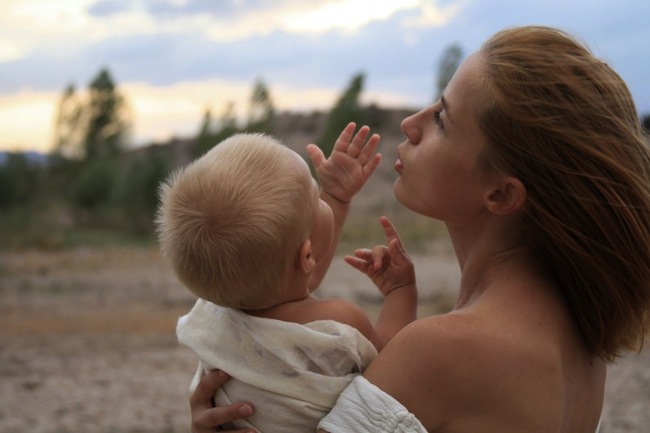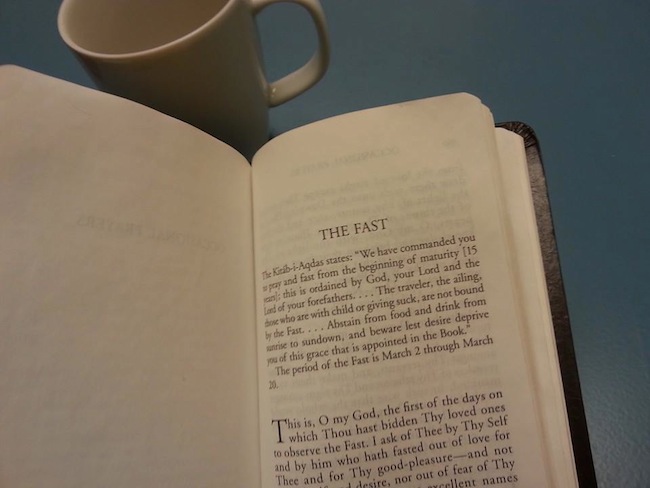For Baha’is obligatory prayer and fasting are two marks of our faith, a means of drawing closer to God, and a source of joy. Part of the Baha’i Fast, which lasts from March 2 to March 20 involves abstaining from food and water from sunrise to sunset; but the physical fast serves as a reminder of abstaining from contention, conflict, and negative or selfish thoughts. Even though the Fast is an integral part of Baha’i life, not all Baha’is observe it each year—and that’s how it’s supposed to be.
Some Baha’is are exempt from fasting for medical reasons or age. And women are exempt while pregnant or breastfeeding.
“O Pen of the Most High! Say: O people of the world! We have enjoined upon you fasting during a brief period, and at its close have designated for you Naw-Rúz as a feast…. Let the days in excess of the months be placed before the month of fasting…. and when they end—these days of giving that precede the season of restraint—let them enter upon the Fast. Thus hath it been ordained by Him Who is the Lord of all mankind. The traveller, the ailing, those who are with child or giving suck, are not bound by the Fast; they have been exempted by God as a token of His grace. He, verily, is the Almighty, the Most Generous.” –Baha’u’llah (Kitab-i-Aqdas, p. 24-25)
Women are also exempt from fasting while menstruating. There are a lot of physical reasons why women could be exempt from fasting. And there’s no question that the Baha’i laws of fasting—and exemption—are very clear.
“God hath exempted women who are in their courses from obligatory prayer and fasting. Let them, instead, after performance of their ablutions, give praise unto God, repeating ninety-five times between the noon of one day and the next “Glorified be God, the Lord of Splendour and Beauty”. Thus hath it been decreed in the Book, if ye be of them that comprehend.” –Baha’u’llah (Kitab-i-Aqdas, p. 23-24)
My own personal feelings about the matter are a lot more muddy, though. I recently stumbled on a paper called Exemption, written by Bahiyyih Nakhjavani. In it she writes:
“An exemption implies a privilege. An exemption suggests a release from a normally unpleasant and burdensome task. This is the underlying assumption about an exemption: it is a privilege that absolves one of an onerous duty.”
This got me wondering about exemptions from the Fast. So I spoke to a few Baha’i mothers who aren’t fasting this year to learn about how they experience the Baha’i Fast—personally, in their relationships, and in their communities.
Lorenia Hatcher lives in Florida and is a mother of two. She said, “It almost feels like exemptions are some sort of a blessing… These babies are little for such a short period of time and they receive their sustenance directly from us for such a brief window that it’s a gift to be able to share that with them.” She added, “That I can do this act of service for them more than makes up for the occasions I don’t get to fast!”
This year marks Anne Apparu-Hall’s second Fast and her first year being exempt. After feeling rejuvenated and uplifted last year, she expressed some mixed emotions about not being able to experience that same feeling again but said, “I am sacrificing for another generation…. You’re not fasting because you’re sacrificing yourself.”
Liz Davis, who is breastfeeding her youngest daughter, is exempt from the Fast as well. She said that during her year of service, she made a week-long visit to an Ojibwe reservation where she learned about different rites of passage—sweat lodges and vision quests—rites required of men but not of women. She said that the experience helped unlock a different perspective on Baha’i fasting exemptions.
For Lorenia, exemption just makes sense. “The Baha’i writings are always very logical and it simply wouldn’t make sense to try and nourish another human being with my body while depriving my body of the sustenance it needs to do so,” she said.
But that doesn’t mean things have always been simple. “I have felt, in the past, like others expected me to fast when my child was older than whatever arbitrary age they thought was ‘old enough’ to wean.” She added, “But ultimately your Fast is between you and Baha’u’llah, and your investigation and understanding of the Baha’i writings.”
Liz reflected, “There’s [sometimes] this level of guilt involved. Like, ‘Well, I should be able to do this,’ or ‘I am strong.’ …But we don’t fast to show how amazingly spiritual [we] are. It’s about wanting to be close to God, but why would you do something to jeopardize your health?”

For Anne, who’s currently pregnant, it’s not guilt she feels. But it’s “harder to connect” to this time of year because she’s not abstaining from food and drink. She eats dinner with her husband, who is fasting and she wakes at dawn to pray. But she said, “I feel a little like I’m missing out in a way.” Then with a laugh, she added, “But I’m feeling a little disconnected in general right now,” referring to her pregnancy.
Liz said that she understands that feeling herself. “The fast is a very physical and in-your-face way to remember…. You think, ‘Why am I not eating?’ and then you immediately think, ‘I’m not eating because I want to be obedient to the Covenant and it’s a pillar of my faith.” For her this hasn’t been her immediate reaction while being pregnant or breastfeeding during the Fast.
Maybe that’s why some women choose to keep “Fast journals,” pray more than usual, or exert an extra effort to serve in various ways. For these women, it’s a personal choice—and something they want to do. But “making up” for not fasting certainly isn’t compulsory and I’d imagine it’s probably a good idea to be mindful of the spirit in which you perform any of these acts. Because even for folks who abstain from food during the Fast—it’s never really about the food. It’s about the spiritual significance.
The resounding message I heard from these women was that, yes, the Fast is different when you’re exempt. Well, okay; I probably could have guessed that. But there’s definitely a reason why exemptions exist in the first place. And if you’re exempt from fasting this year, next year, or the year after that, you’re not alone.
Whether you find common ground with your personal friends, through an online forum, or a Facebook group for Baha’i moms, there are other plenty of folks going through the same thing as you. And even if you don’t feel compelled to share your experience with them, there’s always prayer—and the comfort of knowing that your exemption from fasting is a privilege.
If you were exempt from the Fast this year, we’d love to hear from you in the comments below.

I don’t know if I’m exempt, but not able to fast for health reasons. It makes me feel like I’m missing out on a privilege, so I try to participate by giving up some specific food like chocolate during the Fast.
Excellent article! One I’ll share with friends. As much as I love the quality of the information, I love the sense of emotional and spiritual balance that the writing achieves, so different from the spin oriented, my-way-or-the-highway, superior toned attitude that permeates much journalism these days. Well done!
Wow! Thanks, John.
Candace, thanks for sharing your Fast experience!
Fast has always been a very reflective and peaceful time for me, even when struggling with whatever life was throwing my way or dealing with my own reluctance to acquiesce. This year I did not fast, but in some strange current going through my body it feels like I have. Today I felt exuberant, that a great change and a thousand little changes are in the air. I look forward to Feast tomorrow night. Happy Naw Ruz!